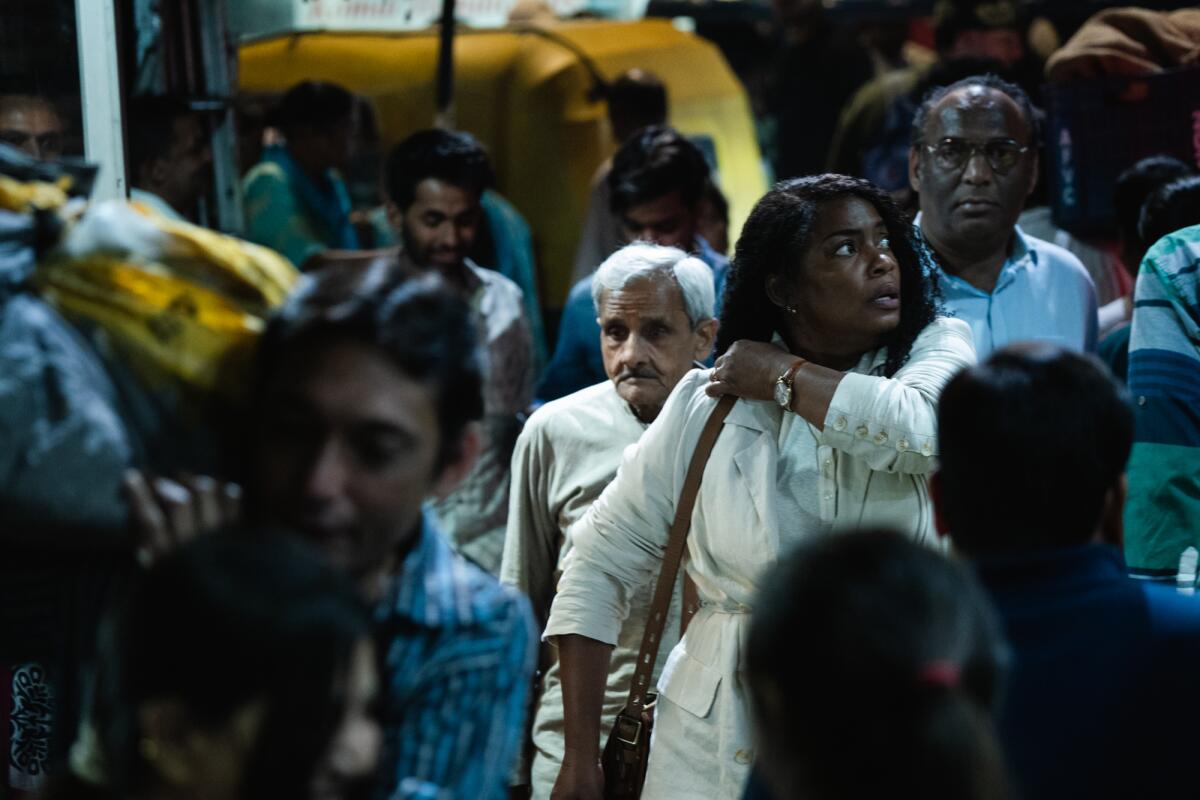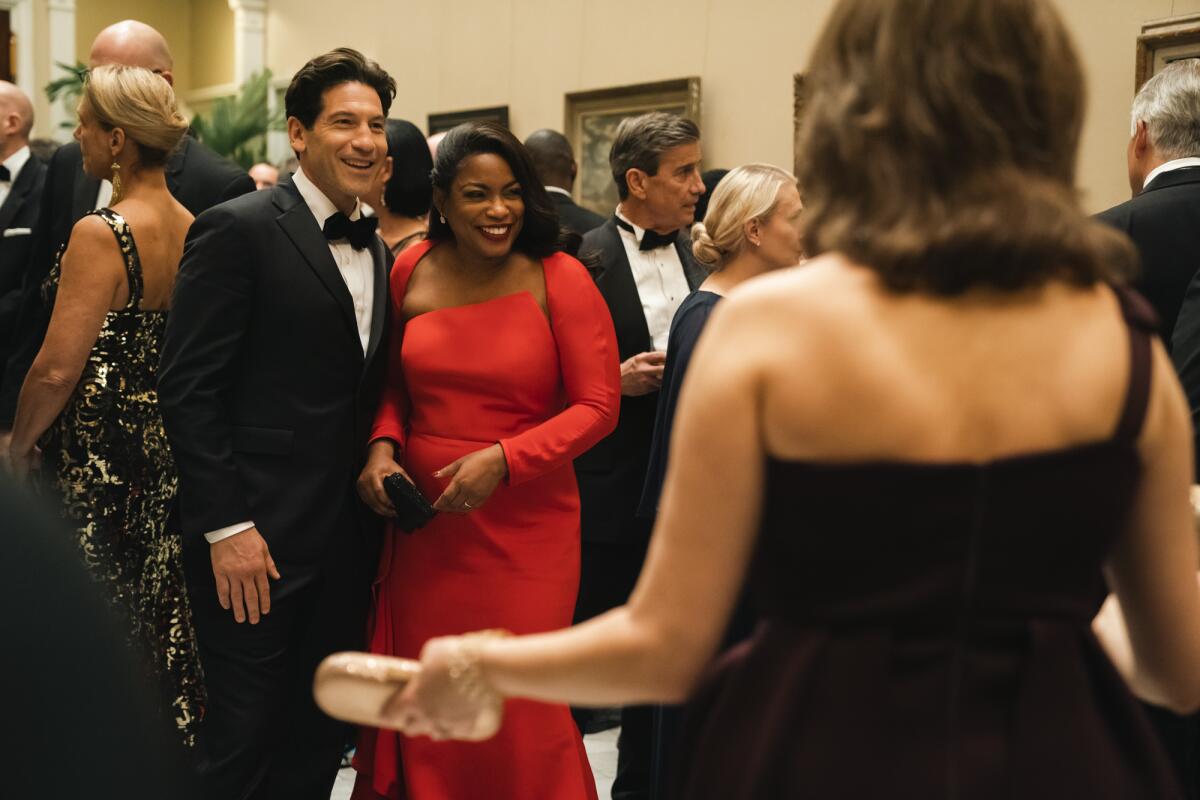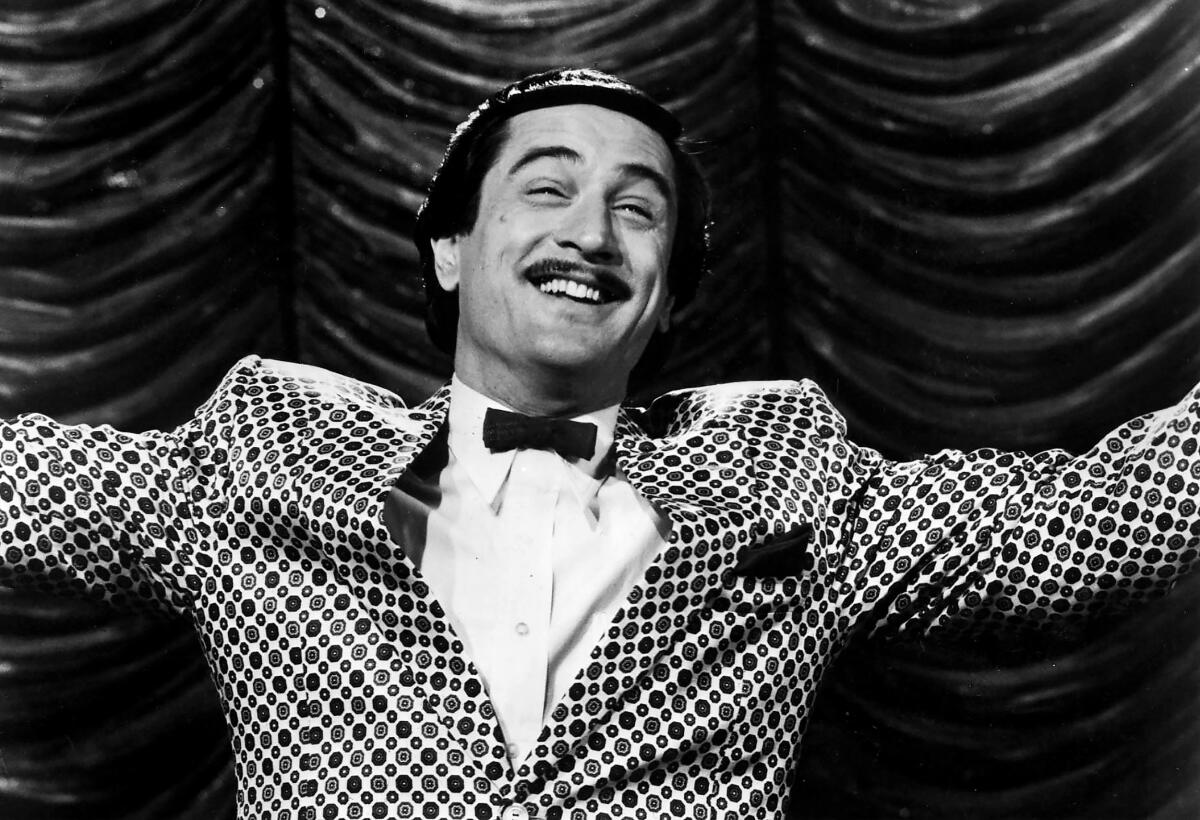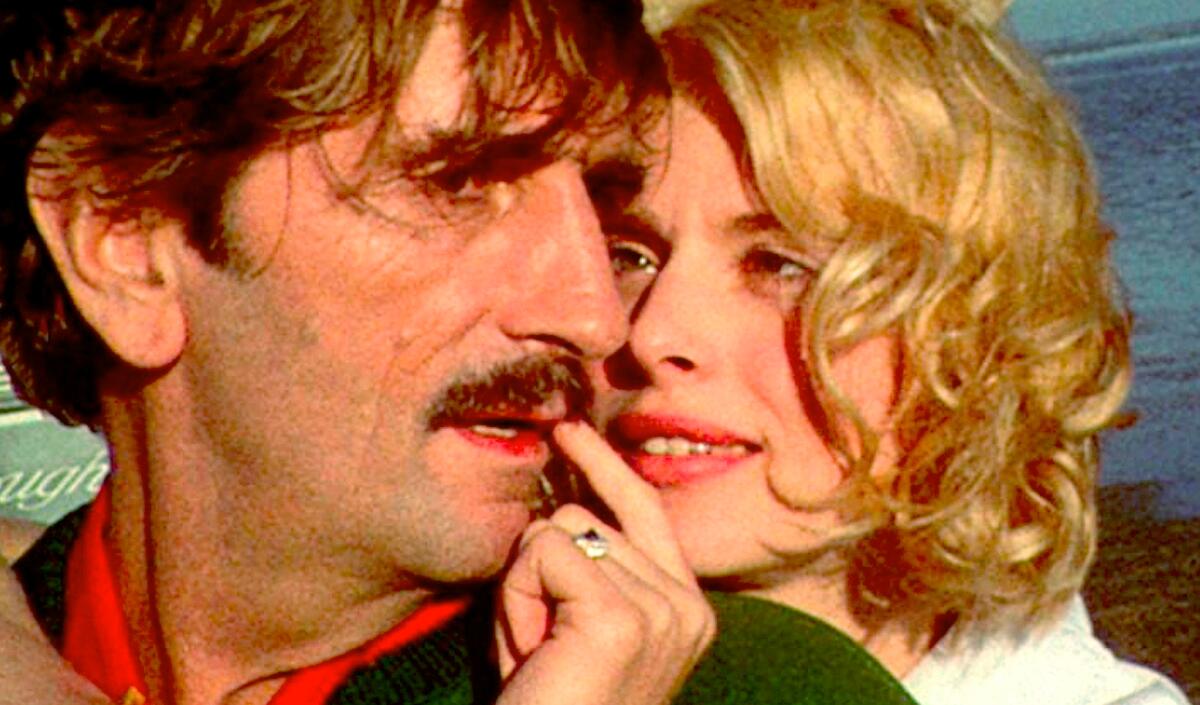Ava DuVernay on her intimate yet epic ‘Origin,’ plus the best movies to see in L.A.

- Share via
Hello! I’m Mark Olsen. Welcome to another edition of your regular field guide to a world of Only Good Movies.
You are reading Indie Focus newsletter
Sign up to get Mark Olsen's guide to movies and what’s going on in the wild world of cinema in your inbox every Friday
You may occasionally receive promotional content from the Los Angeles Times.
The Sundance Film Festival will begin its 40th edition next week and our coverage has already begun.
Glenn Whipp tapped a few titles to watch out for: Aaron Schimberg’s “A Different Man,” starring Sebastian Stan and Renate Reinsve; Jane Schoenbrun’s “I Saw the TV Glow,” starring Justice Smith and Brigette Lundy-Paine; Ryan Fleck and Anna Boden’s “Freaky Tales,” starring Pedro Pascal and Ben Mendelsohn; and Sam and Andrew Zuchero’s “Love Me,” starring Kristen Stewart and Steven Yuen.
I spoke to Eugene Hernandez, who is in his first year as director of the festival. Hernandez, who comes to Sundance after 11 years at Lincoln Center and the New York Film Festival (he was co-founder and editor in chief of IndieWire before that), has himself been coming to Sundance for more than 30 years. He still has his ticket from the Sundance premiere of Robert Rodriguez’s “El Mariachi” in 1993.
“If you’re a kid in your 20s now, or even younger, and you’re inspired to find out more about what a festival is or what Sundance is, I feel like part of my job is to create the space for that discovery to happen,” said Hernandez.
“We are part of an ecosystem,” he added. “We are not separate from it. We are part of it.”
Ava DuVernay’s ‘Origin’ and ‘Selma’
At the Aero theater on Monday, the American Cinematheque is showing Ava DuVernay’s new “Origin” ahead of its theatrical release on Jan. 19, along with DuVernay’s 2014 drama “Selma.” The filmmaker will be there for a Q&A with Black List founder Franklin Leonard.
“Origin” is both an adaptation of Isabel Wilkerson’s 2020 nonfiction book “Caste: The Origin of Our Discontents” and the story of how that book came to be. Aunjanue Ellis-Taylor plays Wilkerson, while Jon Bernthal plays her husband. Ambitiously skipping between time periods and locations, the film combines an epic sense of the sweep of history with an intimate, in-the-moment immediacy to examine how oppressive systems operate on a personal scale.
In his review, Robert Abele wrote, “‘Origin’ demonstrates a deeply felt purpose: to realize how things are and who people are, by doing the work of seeing, reading, listening, then telling others. Where Wilkerson’s book rightly sparked a conversation about what violence and oppression stems from, DuVernay’s vision of that message, at its heartfelt best, holds focus as a worthy sister achievement.”

For the Envelope, DuVernay and Ellis spoke to Chris Vognar about the film. In explaining the film’s premise, DuVernay said, “Caste animates every part of our lives. It’s something that we do not talk about, even though it’s foundational to so much of what we experience.”
And for this week’s episode of the Envelope video podcast, Shawn Finnie visits DuVernay at the offices of her company Array, which she describes as “liberated territory.”
DuVernay spoke about the experience of making “Origin,” career-wise. “Professionally, it’s really changed me in that it’s strengthened my resolve and helped my confidence in terms of my capacity — how much I can do, how I can do it, and that I don’t have to feel constrained. I don’t feel like I have to fit inside of a box. And I felt that for a long time. Personally, it has been the happiest time of my life making this movie — the making of it, the writing of it, the production, the post. ... Making it, just making it, oh, my gosh, I felt so alive, so joyous.”
“Selma” is a dramatized profile of the Rev. Martin Luther King Jr. (played by an impassioned David Oyelowo) and, more specifically, a look at how a small town in Alabama became a focus of national attention leading up to the passing of the 1965 Voting Rights Act.
In reviewing “Selma,” Kenneth Turan wrote, “‘Selma’ is a necessary film, even an essential one, with more than its share of memorable performances and vivid, compelling sequences. … If there is a temptation to canonize ‘Selma’ and brush aside its less successful elements, that’s not surprising given how good much of it is and the heroic nature of the story, not to mention the decades it’s taken for this history to reach the screen.”
Lake Bell intros ‘The King of Comedy’

On Saturday, Vidiots will show Martin Scorsese’s 1982 film “The King of Comedy.” The screening will be introduced by actor and filmmaker Lake Bell, who said of the film, “‘The King of Comedy’ is the only film I can watch over and over again and laugh/marvel in its genius like it’s the first time seeing it.”
The film, which bombed at the box office when first released but has grown in stature over the years, follows an aspiring comedian named Rupert Pupkin (Robert De Niro) who, after a chance encounter with his hero, the late-night talk show host Jerry Langford (Jerry Lewis), becomes increasingly obsessed until he kidnaps Langford in a bid to get a spot on his show. The film is by turns terrifying and hilarious, a treatise on fame and fandom that plays like a funhouse inversion of Scorsese’s “Taxi Driver.” Sandra Bernhard is brilliant as Rupert’s demented accomplice Masha. (And if you didn’t watch “The King of Comedy” before seeing 2019’s “Joker,” you’ve got some homework.)
In a March 1983 interview with Dale Pollack in The Times, Scorsese said, “I saw a large part of myself in Rupert Pupkin. It’s the obsession of wanting something so strongly and being so ruthless that you take it to the point of acting out fantasies in which you cross the line between sanity and insanity.”
“The King of Comedy” was Scorsese’s first film to be released following John Hinckley Jr.’s 1981 attempt to assassinate President Ronald Reagan after becoming obsessed with “Taxi Driver” and its young star, Jodie Foster. In exploring that connection, Scorsese said, “We made these pictures out of completely honest motivations, basically a personal exploration of my feelings, my emotions, my psyche. I didn’t expect anybody to go see ‘Taxi Driver’ or ‘Raging Bull.’ I didn’t expect them to make a dime. I think it’s only me who has those bad thoughts. I’m a true Catholic. I’m sure other people feel the same way, but I feel I’m sure I’m a horrible person.”
Other points of interest
Wim Wenders at the American Cinematheque

Filmmaker Wim Wenders is currently back in the awards conversation as his film “Perfect Days” made the recent shortlist as Japan’s entry for the international feature Oscar. The American Cinematheque has begun a 15-film retrospective with Wenders himself in person this weekend for Q&As at the Egyptian following some of his best-loved movies. Wenders is currently scheduled to be there for “Wings of Desire,” “Until the End of the World” and “Paris, Texas.” (The Academy Museum is also screening “Paris, Texas” on Jan. 17.
Other films in the series include Wenders’ road-movie trilogy consisting of “Alice in the Cities,” Wrong Move” and “Kings of the Road,” the documentary “Buena Vista Social Club,” the Patricia Highsmith adaptation “The American Friend,” plus “The Goalie’s Anxiety at the Penalty Kick,” “Lightning Over Water” “Notebooks on Cities and Clothes,” “The State of Things” and “Faraway, So Close!”
In July 1990, The Times’ Kristine McKenna turned in an astonishingly candid report from the production of “Until the End of the World,” as the film was shooting in San Francisco. As Wenders said, “There is one truly amazing thing about filmmaking, and that is that the film can be an experience that can affect you and teach you as its maker, just as it can teach anybody else. That’s why my films are shot in continuity — that allows the story in the film to intermingle with the stories of our lives as we make the film. If there is a central ethic in my filmmaking, it’s that the film should not only describe an adventure, but should in itself be that adventure.”
‘Airplane!’ and ‘Top Secret!’
Sometimes you just need to laugh. And sometimes you need to laugh a lot. The New Beverly will have a double of “Airplane!” and “Top Secret!” next Thursday and Friday that should do the trick. Both films are from the filmmaking team of David Zucker, Jim Abrahams and Jerry Zucker and pack in more jokes than one can fully take in all at once; it’s not unusual for there to be some bit of business happening in the background as a separate joke is being delivered. “Airplane!” from 1980 is a spoof of 1970s disaster movies. It stars Robert Hayes, Julie Haggerty, Robert Stack, Lloyd Bridges, Peter Graves and Leslie Nielsen. “Top Secret!” from 1984 takes on wartime spy thrillers and Elvis star vehicles at the same time. And it features a young Val Kilmer in his film debut.
Only good movies
Get the Indie Focus newsletter, Mark Olsen's weekly guide to the world of cinema.
You may occasionally receive promotional content from the Los Angeles Times.




